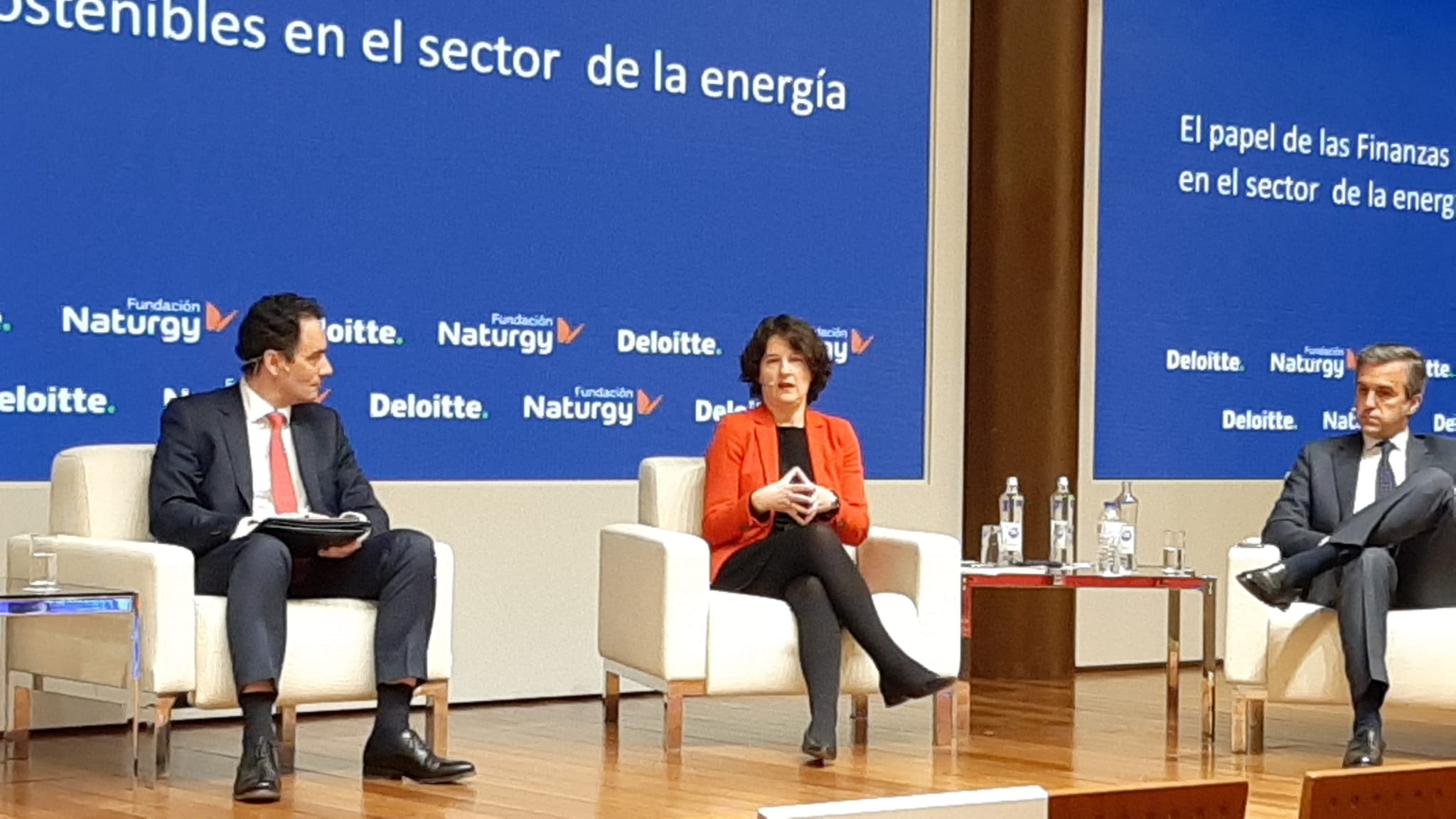79% of climate bonds issued in Spain in 2020 were used to invest in renewable energy and energy efficiency.
In Spain, sustainable financing has increased nine-fold over the past five years and in 2020 it grew by 45% compared to the previous year.
A study by Deloitte published by the Naturgy Foundation analysed the boom in sustainable financing within the framework of the energy transition and decarbonisation by 2050 objectives.

Sustainable financing has become a key tool for transforming the business model of companies that operate in the energy sector and for meeting the demands of energy transition. Climate bonds are one of the fastest growing sustainable finance products. According to the report “The role of sustainable finance in the energy sector”, created by Deloitte and published by the Naturgy Foundation, 79% of climate bonds issued in Spain in 2020 were used for renewable energy and energy efficiency activities.
“Sustainable finance will play an essential role in redirecting capital flows towards decarbonisation and sustainability objectives, and the energy sector is the key player in this transition,” explained Concha Iglesias, partner responsible for Climate and Sustainability at Deloitte Spain and co-author of the report that was presented today.
Iglesias highlighted that “energy companies are engaging in significant investment in renewable energy, efficiency, modernisation, new energy vectors and network digitalisation, as well as innovation for the development of technology in areas such as carbon sequestration and energy storage.”
Oliverio Álvarez, partner responsible for Energy Regulation at Deloitte Spain, stated that “in line with government estimates, over 50% of the investment that will be required for transformation by 2030 will be made in the energy sector, specifically on measures related to electrification, renewable energy and network development.” According to Álvarez, “as well as generating significant financial returns for well planned and executed projects, we will see increases in GDP and employment, and improved environmental and health indicators.”
The energy sector is using sustainable finance, which considers environmental, social and governance (ESG) criteria, as an essential tool for transforming its business model. The objective is to make it increasingly sustainable and this type of financing has become a key element in making the energy transition possible.
Sustainable financing increases nine-fold in Spain in five years
The study analysed the evolution of sustainable financing over the past five years, taking into account climate, sustainability and social bonds, and loans and green/sustainability-linked credit. Sustainable financing represented almost 2000 billion dollars worldwide during this period, and 732 billion dollars in 2020.
In Spain, sustainable financing has increased nine-fold over the past five years, reaching 33 billion euros and growing by 45% compared to the previous year. During the 2016–2020 period, the total volume of sustainable financing rose to around 85.861 billion euros.
“The financial sector is aware of the need for and value of these investments and is focusing on this type of product,” explained Fernando Foncea, partner responsible for Sustainable Finance in the banking sector of Deloitte, who went on to say that “at present, 32% of bonds issued around the world under the Climate Bonds Initiative standard are energy sector bonds.”
Iglesias explained in her presentation that, in Spain in 2020, the volume of sustainable loans and credit overtook the value of sustainable bonds to represent 55% of all sustainable financing. She also added that, “during the first half of 2020, Spain held third place in the list of countries that issued the greatest number of sustainable bonds, with local governments issuing 8.7 billion dollars’ worth.”
The growth in sustainable finance must go hand-in-hand with regulations to standardise and drive this growth forwards. The report touched on this by setting out the objectives and importance of EU taxonomy, described by Foncea as “an ambitious action plan to develop and regulate sustainable financing, an area in which a third of activities are driven by the energy sector.”
Complying with the 2030 Agenda and meeting the demands of ecological and social transition objectives requires a vast amount of public and private resources, which means significant investment opportunities for the financial markets, as well as economic and social growth. The United Nations estimates that sustainable development could generate 12 billion dollars’ worth of market opportunities and create 380 million jobs around the world.
Similarly, the European Commission’s Green Deal is predicted to mobilise at least a trillion euros of sustainable investment over the next decade, while the Integrated National Energy and Climate Plan (PNIEC) 2021-2030 quantifies investment at 241 billion euros.
Representatives from financial institutions also took part in the report presentation, as well as Nuria Rodríguez, Environment and Social Responsibility director at Naturgy. Rodríguez stated that “you can no longer envisage any kind of business without combining the three ideas: environment, social and governance,” and she highlighted that “sustainable financing is the remedy that is helping us to carry out the transformation towards energy transition, which is an opportunity for change that will help us build a sustainable world.”
Pablo Pérez-Montero, director of Sustainable Finance in Corporate Banking and of Investment at CaixaBank, emphasised that “since 2015 Europe has become particularly aware of the sustainability variable and has effectively incorporated it into regulations.” He explained that, in regulatory terms, it is a leader in sustainable finance and a model for countries such as the US and Canada.
Lara de Mesa, director of Responsible Banking at Banco de Santander, maintained that “sustainable finance is an opportunity to do things differently, to take note of the social impact and retain our natural capital.” “Working together with our clients during this transition is one of our priorities,” she continued, commenting that “the energy sector was the first to announce an alignment strategy, which means reducing our exposure to high-emission sectors and supporting renewable energy.”
Blanca Navarro, director of Strategy and Evaluation at the Instituto de Crédito Oficial (ICO) referred to sustainable finance as “an indispensable tool for merging needs, prioritising where we are going with our financing capacity, in both the public and private sectors.”
Share